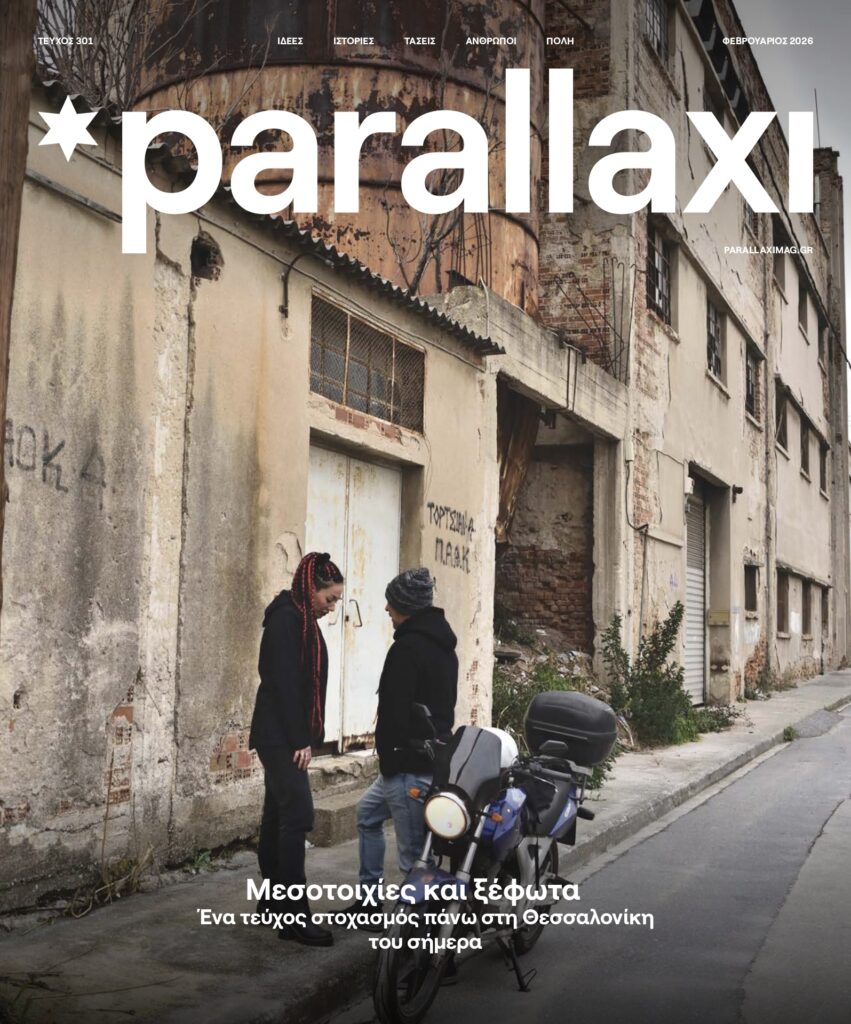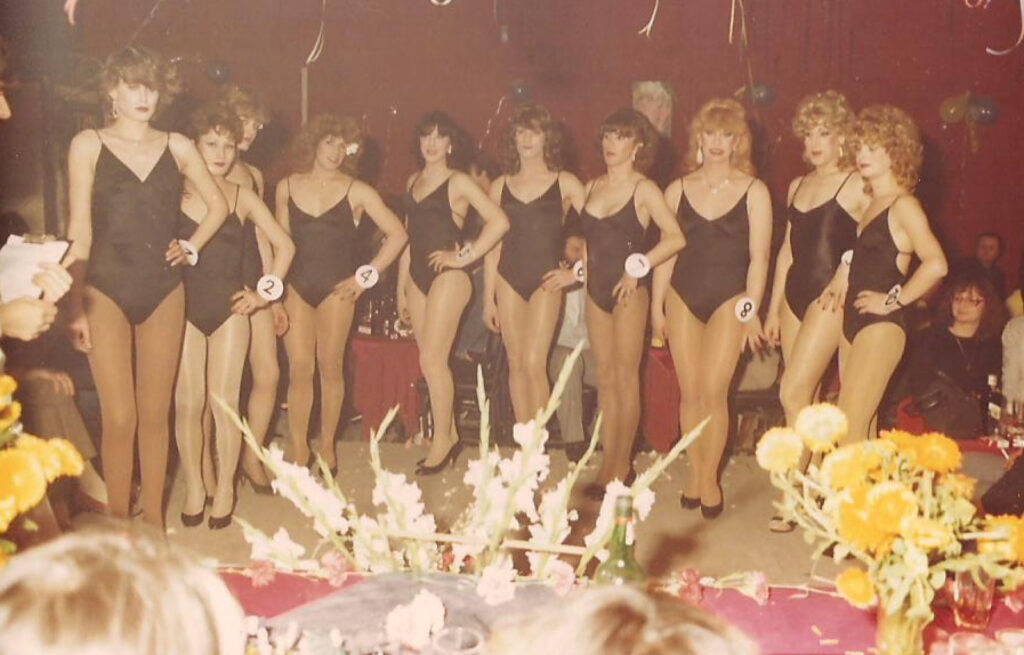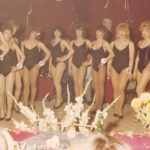The history of the trans community – An experiential story
Βeing trans was primarily a matter of survival not a realization of one’s gender
Words: George Tsitiridis
Translation: Theodora Tsali
My difficulty in finding an apartment in Thessaloniki drove me to the blissful coincidence to rent a very cheap top-floor apartment in the heart of Vardari with the view of various cabarets, pubs, strip clubs, cheap hotels, the remaining prostitutes, travesti (that’s how we used to call them) at the court areas, at Milo’s turn, at Polytechniou avee, at Fragon and Valaoritou…
A freezing, rainy, November night, I was heading back to my apartment, very lightly dressed with a t-shirt, so short that it even couldn’t reach my belly-button. I was freezing. The streets were dead empty, except that likable blonde hooker with the huge black fur coat who was standing next to ‘Villa Petridi’
-Boy, you must be cold! She said and opened her coat and hug.
I observed her outfit: she was only wearing suspenders and her underwear. The sweet lady that I thought of her as an outdoor hooker, was a trans woman. When I told her that she laughed so hard, ending up loving to mention this story every time she had the chance.
That was the first acquaintance with my neighbor called Nana, who was meant to become one of the most important people I had ever met in my life as well as a loyal and loving friend until the end.
Although the ‘businesses’ at the area of Vardaris were flourishing, a black cloud covered the hustles in the current years. The ‘AIDS nightmare’ as the survivors called it.
While everybody used to seek to have a trans woman in their friend group, suddenly those people who were once widely accepted became the ‘contaminators’. People attacked, booed and “seeing them they changed sidewalk”, as Nana used to say.

The AIDS ‘madness’ blew many ‘traditional’ spots away. Stasa, Sehrazat (Sehra ), Paradise, the coffee shop Heaven, the most honky tonks of the 80s and the 90s went out of business, while other similar spots in which spaces for singles who were in search of a relationship, like Eftichia, Alitsos, Iliovasilema, Saki’s Angels opened near them. In Sehrazat and Paradise, the patrons enjoyed music programs and shows of trans girls. A whole generation grown-up in oppression and many taboos, were having fun, chasing prosperity, freedom and carelessness as Andreas and PASOK had promised.
In a conservative society that was slowly-slowly standing up for itself, the woman was still subordinate to the man, the one who had to keep her ‘honor” and have sex after she was almost sure that she was going to marry that individual, ending up with kids and the duties of a good ‘housewife’. This generation of men believed that the chick who doesn’t hook up with them is serious and ‘worthed it’ to be the future mother of his children. The rest of them were the ones who were provocative, the ‘easy’ to sleep with and who, because of that, would get heavily stigmatized, something that would follow them throughout the entire city regardless of its big size. Women enjoying sex was a big taboo. Choiceless, young training soldiers, sailors, boytoys, walked with every chance to parks, bars, hustles, restrooms to find gay men or trans women to have sex with.
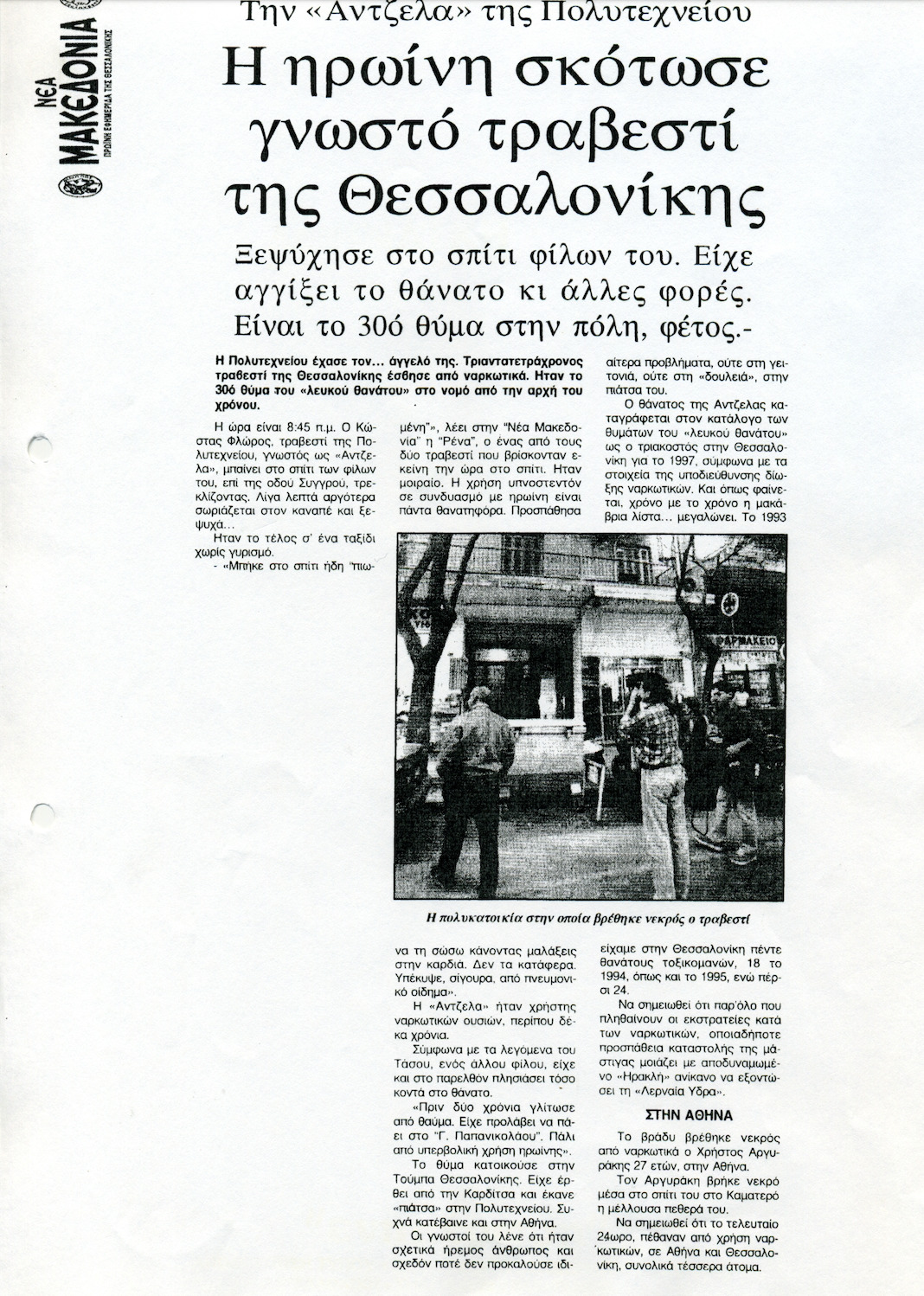
In fact, at that age, trans-women invested a lot in their appearance and to what they called ‘I want to deceive them and make them think I’m a woman”. It was the age that the pluralism of identities and sexual orientation didn’t exist. For the typical Greek the theories over gender would take a long time to appear. In the mind of the every-day person, the genders were two: male and female. Everything was translated into two roles which are defined in terms of behavior. That is why the extreme expression of gay and trans femininity was required, the roles had to be clear. The male is the ‘stallion’, the passive impersonates the woman (unfortunately, in many instances, this hasn’t stopped today).
Honky tonks and hustles that left their stigma in the sexual cartography of Thessaloniki, one by one gave their place to the modern clubs and bars. The trans prostitutes and the ‘sexual spots’ were the first victims of the Gentrification procedure, through which degraded areas of a city are left helpless to decline in order to be bought by real-estate agents and upper-middle class citizens in an exceptional offer, in order to rebuild and redesign into malls, recreational centers and apartments. The once filthy Ladadika of the last weirdos, that only the most muscular walked through it in the night for a quickie behind those charmless warehouses, all these transformed into the heaven of entertainment.
The black holes of chaos, the city’s dark areas, through those businesses’ intervention could bring a lot of money, rather than standing there, purposeless and useless. Vardaris, Ladadika, Valaoritou , Dragon, Politechniou, Fix, Milos and Vilka, sexual substitutes for many many years faced a profound flourish, days and nights of glory with the trans women chased, ready to claim the next abandoned street for their own new hustle. A whole team of people was constantly searching the next dark shelter, with an end at Giannitson Avenue which at that point was evolving into a regular residential area. With a new mall and various department stores, making the prostitutes’ future uncertain.
Back in those years, being trans was primarily a matter of survival not a realization of one’s gender. The feminine boys and the trans silently accepted the role society had given to them and tried to stand up for themselves with the only weapon they could easily use: SEX. There was not a possibility for movements like that to gain their rights. This generation would have to wait for years in order to step on the footsteps of various trans women such as Marinaki, Beba, Nana, Taira, Tasbi, Stella, Tzouli, Stefany, Andiana who gave their own race for the hardest activism, this of the sidewalks where they used to search for clients.
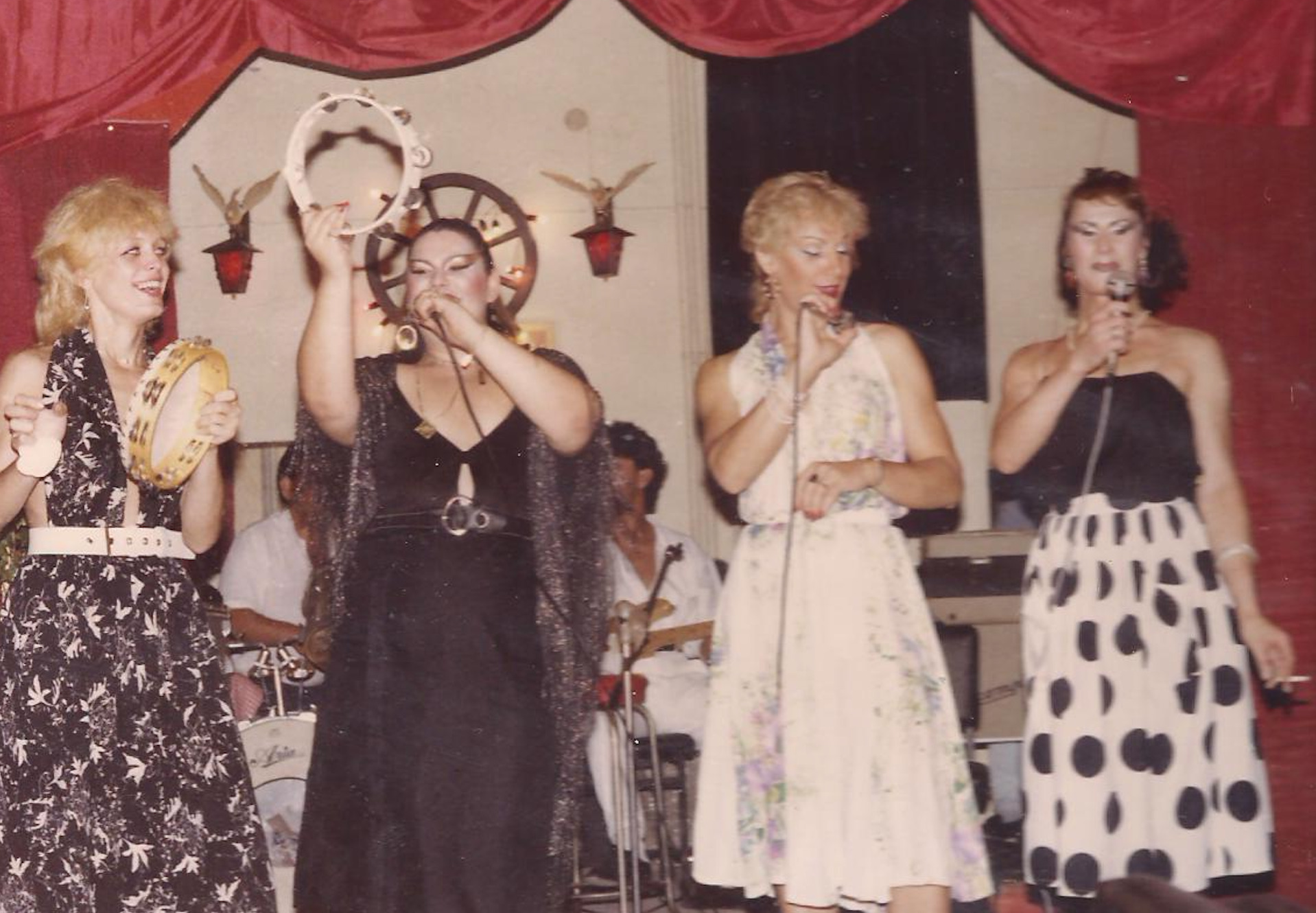
The 80s and 90s trans people didn’t really conceive the concept of ‘gender identity’, the sexual orientation as they do today. The primary reason for it was that the prostitutes were in their majority simple people, who were chased by their families and their neighborhood, and didn’t manage to finish school.
Most of the narratives of the legendary personalities of the specific community, like Betty who worked on writing and theater, Paola who became a publisher, talked about the difficult circumstances, boot camps, hustles and prosecutions since their very young age. Eua Koumarianou, admits that she never completed elementary school and she can write or read with difficulty. The same happened to many other trans women as well as gay men too who had dreams that never came true as they never had the support and the means, the choices for a different life. The night was their world and the people on the sidewalks. There was no luxury for anything else other than their survival.
The paraffin on their breasts that froze and had to wear a bra, waxing with laser, silicones on the face that turned into stone and distorted noses and cheeks… Anything that could make you look like a woman was more than welcome. Looking like a woman was something that they accepted as a ‘condition’ for the role they had taken. They believed that they were something more than the regular women, they felt they embraced femininity to the fullest, who did whatever they could to compete against the booing and the bad comments, while attracting the sluts who saw them as something exotic.
Trans women were the stars of the friend groups, they talked about their sexual experiences (exaggerating them) and created a myth upon their name. They were funny, provocative, and stunning. Passion was the motto of their life, without thinking of the ‘tomorrow’ and most importantly they were the ones who created a new sexual culture, training thousands of boys to how they have to make love with their girls and thousands of women who sought advice for what men liked in bed.
Unconsciously, those women created part of the women’s emancipation and liberation of sex in a society which still lived under the roof of an outdated society’s morality.
Nevertheless, the trans community was not yet in a position to shape a powerful political reasoning and demand their rights. The exception was Aloma, who attempted many things without great results.
Her name has been stigmatized, nevertheless she was pioneering, leaving as a significant consignment the “Travesti Beauty Contest’ that she was hosting for some years during the period of HELEXPO, the erotic movies: the Flirt of the Travesti, the House of Madam Aloma, Vlachoi Prefer the Travesti (filmed in a sheep farm in Chortiatis, Thessaloniki) as well as the first LGBTQ+ party which tried to get into the parliament with the name P.A.K.I (Panhellenic Independent Equality Movement), with the slogan “PASOK promises brighter days, our promise is better nights”.
The new century’s dawn brought many changes and among them, the cell-phones and the internet. Thessaloniki’s cult figures, the stunning trans women and the beautiful gay boys were the last victims of a tough, dark age that they lightened with their shine, opening the path of a new reality.
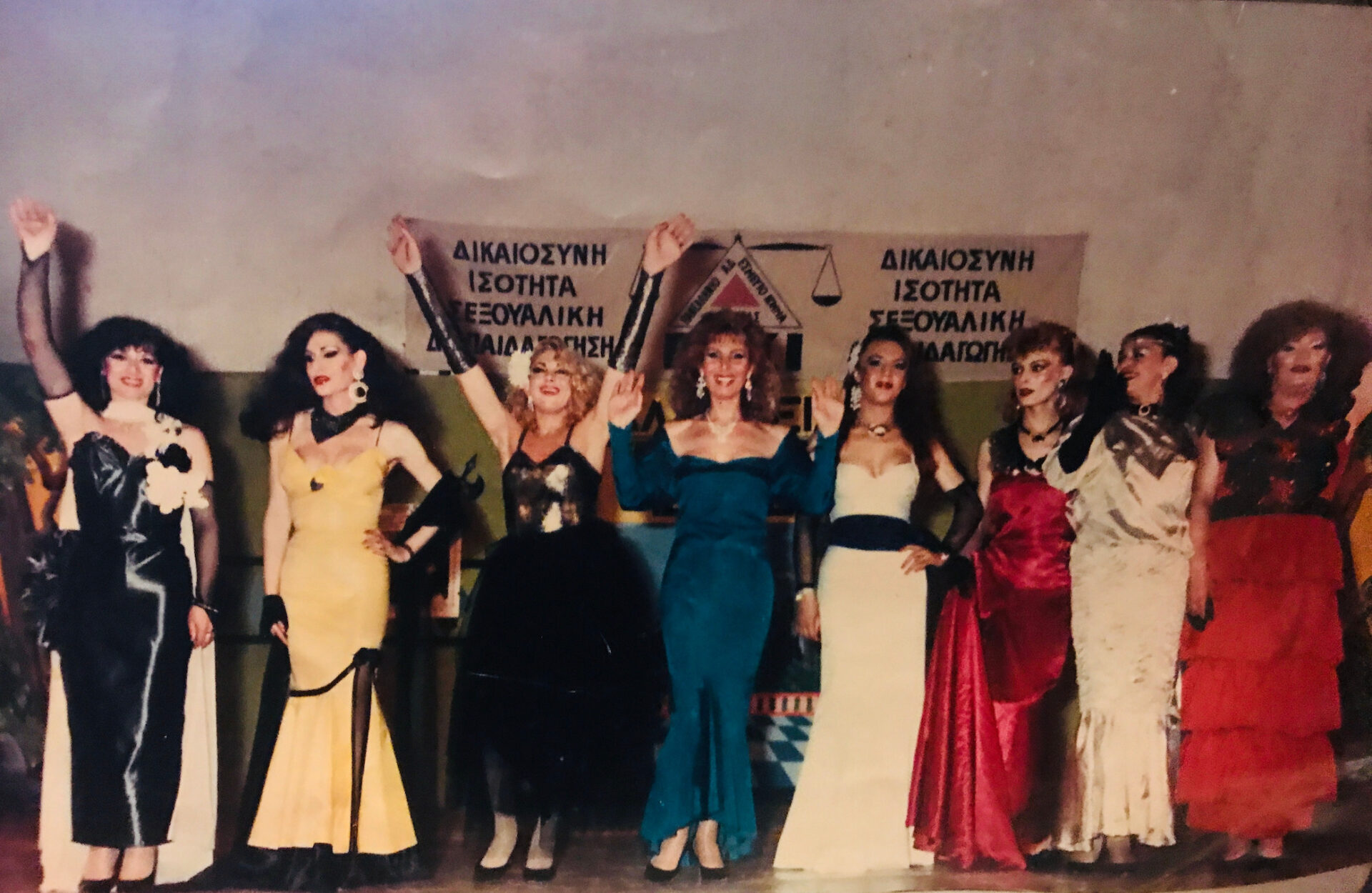
It was then, when the LGBTQ+ movement was shaped at every level and started to be deeply concerned about gender identities and sexual orientation, through which the Pride, organized communities and a society less hypocritical, more informed, sensitive, open and the LGBTQ+ community accountable and respected. Trans people were finally able to ‘raise’ their voice and managed to achieve a lot on societal and institutional level.
In 2010, Marina Galanou, created the Association on the Support for Transgender people, one of the most active organizations of the movement until today. The biggest victory was the approval of the gender identity bill together with the legal contract for cohabitation and later the legalization of gay marriage. For the first time, trans men acquire recognition and the notion of queer, intersex, non-binary, right now are becoming more and more accepted and respected by society.
The past constituted the starting point and the reference point for the present and the future. Without the brave ones of the past, who showed us the path and ‘sacrificed’ themselves, we would still have a long way to go. Sometimes marginalized even from its own LGBTQ+ community, the trans movement passed through so many hardships until it was recognized for its contribution and its greatness.
Besides, we shouldn’t forget that trans women have always been the ones who got things started, as they had nothing to lose. Gay and lesbians could always hide their identities. The trans identity was the face of the revolution, this that when you looked at it deep in its eye, it reminded you of the world’s hypocrisy.
